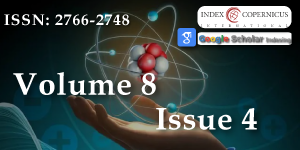What is the True Value of Fuzzy Reasoning in the Framework of the ‘Human Intelligence’ Linguistic Variable?
Main Article Content
Abstract
Computations are presented in the framework of ‘human intelligence’ linguistic variable. Computation concern fuzzy reasoning i.e. the true value of the implication 'IF…THEN'. Computation reveal high dependence of the true value of a rule on the meaning of fuzzy logic operator 'IF…THEN'. The effect of the incorporation of different kind of understanding of the fuzzy logic expression ‘Intelligent’ in the premises of fuzzy reasoning is presented. This framework makes it possible that in cardiology “severe” and “moderate” pathology may be both be “true “for a given patient.
Article Details
Copyright (c) 2025 Cojocaru AV, et al.

This work is licensed under a Creative Commons Attribution 4.0 International License.
1. Boole G. The laws of thought. London: Walton and Maberly; 1853.
2. Bardossy A, Duckstein L. Fuzzy rule-based modeling with applications to geophysical, biological, and engineering systems. Boca Raton: CRC Press; 1995. Available from: https://doi.org/10.1201/9780138755133
3. Dubois D, Prade H. Possibility theory: An approach to computerized processing of uncertainty. New York: Plenum Press; 1988; 268. Available from: https://archive.org/details/possibilitytheor0000dubo
4. Dubois D, Prade H. Fuzzy sets in approximate reasoning. Part 1: Inference with possibility distributions. Fuzzy Sets Syst. 1991;57(2):173–181. Available from: https://hal.science/hal-04069818v1
5. Mamdani EH. Application of fuzzy logic to approximate reasoning using linguistic systems. IEEE Trans Comput. 1977;C-26(12):1182–1191. Available from: https://doi.org/10.1109/TC.1977.1674779
6. Kosko B. Neural networks and fuzzy systems: A dynamical systems approach to machine intelligence. Englewood Cliffs (NJ): Prentice Hall; 1992;449. Available from: https://dl.icdst.org/pdfs/files3/89a89521a4e96ecbecfd5d4dc42b9279.pdf
7. Cojocaru AV, Bălint St. IQ index interpretation using fuzzy sets. Preprint.
8. Zadeh LA. The concept of a linguistic variable and its application to approximate reasoning—I. Inf Sci. 1975;8:199–249. Available from: https://doi.org/10.1016/0020-0255(75)90036-5
9. Blinowska A, Duckstein L. Medical applications of fuzzy logic—Fuzzy patient state in arterial hypertension analysis. IEEE EMBS Trans. 1993.





